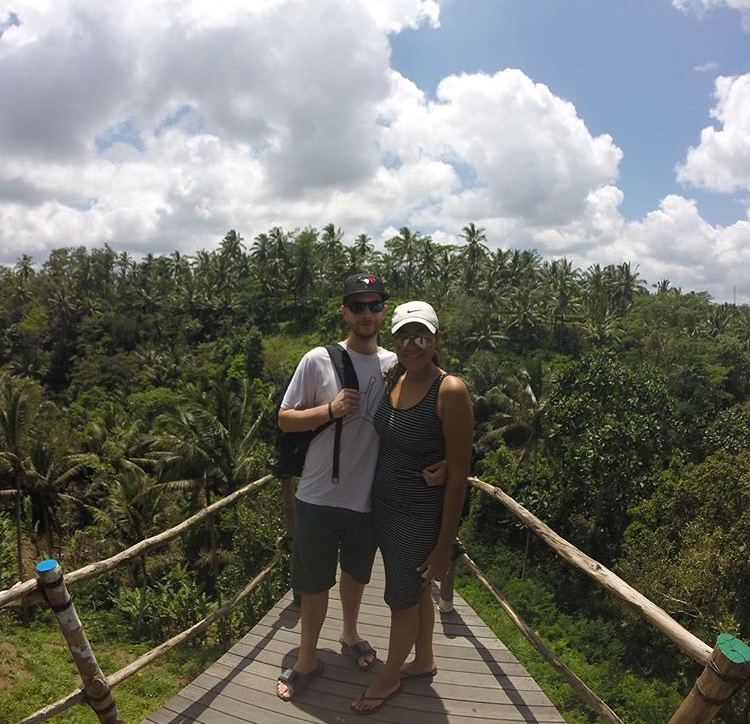
Newlyweds Anita and Cody Jones aren’t letting a potential volcanic eruption ruin their honeymoon.
(COURTESY Anita Jones/Instagram)
By: Olivia Morris
Honeymoons should be a time to celebrate the union of marriage. Couples will travel to an exotic place, bask in the sunshine and enjoy some much-needed time away with their newlywed in seclusion.
This hasn’t been the case for Mr. and Mrs. Jones, who had to flee the region around Mount Agung in Bali, Indonesia following warnings of a volcano erupting.
Toronto newlyweds Anita and Cody Jones left for their honeymoon destination on September 25. The couple arrived in Bali two days before officials announced additional exclusion zones on the tourist island.
“A volcano in the area is apparently at a high alert of eruption,” Anita Jones told Humber News.
“Everyone in surrounding villages are evacuating. The place we are staying at is so gorgeous and it took me forever to find this place,” she said.
The newlywed couple were originally residing at the Melasti Beach Bungalows. Locals advised the two relocate, due to their close proximity to the volcano.
An exclusion zone of a 9 to 12 kilometre radius from the crater has been in effect since Friday, marking it a level 4 alert for volcanic activity; Iceland’s Eyjafjallajökull was marked a level 4 on a five-grade scale.
A volcanic eruption could cause inconvenience for tourists wanting to leave the island. Flights coming in and out of the island could potentially be delayed or cancelled until air officials deem it safe to fly.
“The issue with ash and airplanes is the ash from volcanos is not like the ash you get from a camp fire, where it’s woody debris that’s been burnt and is soft and soluble,” said Melanie Kelman, a physical scientist for Natural Resources Canada.
“Volcanic ash is essentially tiny fragments of shattered rock, so it’s like sand in the air. This can have an adverse effect on surfaces because when it hits it can abrade them, which can cause it to become cloudy,” she said.
A weekly volcanic activity report by the Smithsonian Institution Global Volcanism Program says the number of evacuees has reached more than 96,000, an increase of 25,000 since its initial evacuation report.
The Government of Canada updated their natural disaster and climate website informing Canadians traveling to Indonesia.
“In the event of an eruption, volcanic ash clouds could significantly disrupt air traffic in the region,” the government wrote on their website.
The Jones’ have received a refund from the hotel they initially booked with and are set to move 40 kilometres away to Alam Puisi Villas in Ubud, Indonesia tonight.
“They’ve been evacuating locals since we got here,” said Cody.
“Our hotel has been nothing but chaotic and [all of] the staff are overwhelmed. This is not how I pictured my honeymoon experience,” he said.
Recent hurricanes that devastated the U.S. Eastern Seaboard forced the evacuation of thousands of people in Florida.
Florida resident Shurine Franzoi recalled her evacuation experience as Hurricane Irma passed through her neighborhood in Pompano Beach, Florida.
“I was told by officials to evacuate my condo just two days before Irma hit,” said Franzoi.
“I work at North Broward Hospital and had no choice but to bunk there with coworkers and wait for the storm to pass. My condo is right on the beach, so I’m thankful I had a safe place to stay in the meantime,” she said.
The hurricane’s impact on Florida extended northward along the Florida West coast, leaving a trail of destruction in its path.
As for the Jones’, the possibility of cutting their honeymoon short is not out of the question.
“We should be fine, as long as we’re not in its path,” said Anita.
“We’re going to try our best to enjoy the honeymoon we deserve, while keeping a close eye on the news,” she said.

